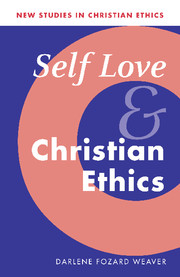6 - Self love, religion, and morality
Published online by Cambridge University Press: 12 November 2009
Summary
I began by noting how contemporary philosophical moral anthropologies truncate the self. This chapter explores the intimate relation between the moral and religious dimensions of human existence. Here I argue that (1) theological (particularly Christian ethical) discourse recovers and expresses this inter-relation and (2) the religious relation to God relativizes morality, but religious constructs must be subject to moral critique. A hermeneutical account of self-relation provides a way to address a number of important questions in ethics; by exploring the place of explicit faith in right self love, we also learn something about the scope and specificity of Christian morality and ethics. This clarifies the contribution Christian ethics makes to wider debates about the self and about foundationalism in ethics, debates that, we saw in Chapter One, re-cast and heighten the problem of self love.
Already I argued that formally or structurally speaking right self love designates a form of self-relation that responds lovingly to the divine self-offer and actualizes this response in love for neighbors. The inexhaustible and happy particularity of persons shows itself in the conceptual and practical resources that mediate self-relation and relation to God, and in the material acts and relations in which persons posit them. Explicit faith provides a set of conceptual resources and practices through which a person understands herself and the world. Are these resources one set alongside others? Do they express and prompt relation to others and community or do they contribute to moral subjectivism and/or intolerance?
- Type
- Chapter
- Information
- Self Love and Christian Ethics , pp. 208 - 250Publisher: Cambridge University PressPrint publication year: 2002



